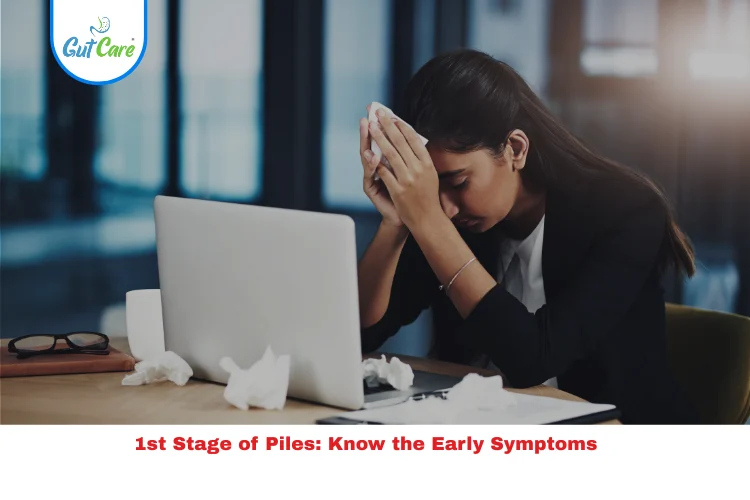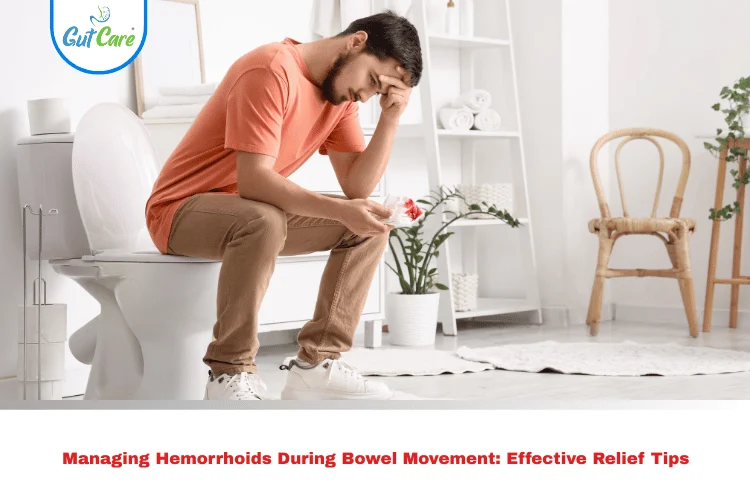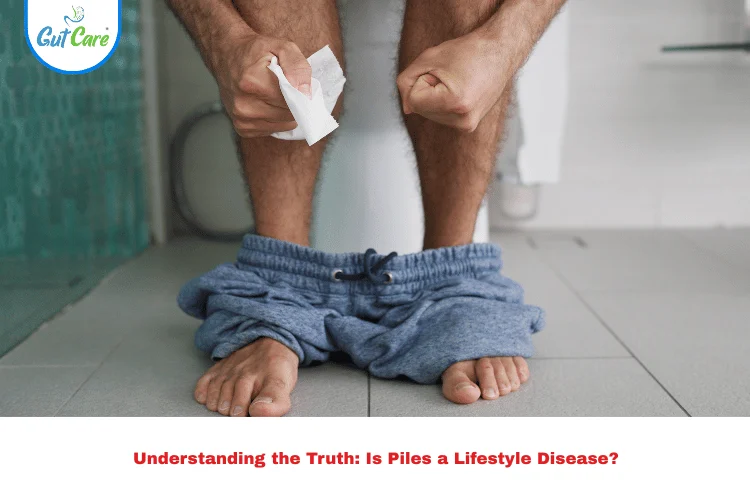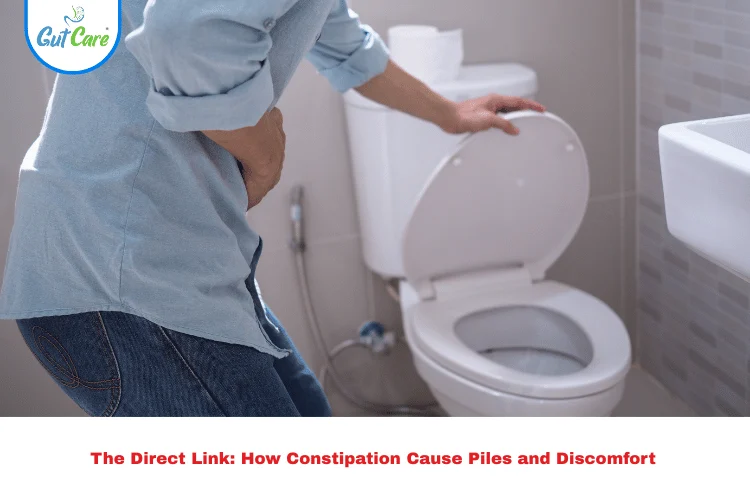The 1st stage of piles, also known as piles stage 1, means the earliest and most manageable phase of hemorrhoids. In this stage, symptoms are generally mild and can be controlled effectively with lifestyle changes, home remedies, and early medical care. At GutCare Clinics, our skilled proctologist Dr. Yuvaraj Singh Gehlot, skilled in identifying and treating piles even before they develop into more painful or challenging stages. Knowing the early stage of piles and understanding what causes it can help patients avoid surgical procedures later.
What is the 1st Stage of Piles?
The 1st stage of piles is when the swollen veins inside the rectum start to enlarge but have not prolapsed out of the anus. Many patients may not notice this stage. However, early diagnosis is very important in order to prevent further development.
Piles are classified into four grades. Grade I—or piles stage 1—is the mildest and often presents with occasional bleeding or itching but without visible external lumps or prolapse.
Common Piles Starting Stage Symptoms
In the early stage of piles, the symptoms are subtle but distinct. Here are the most common piles initial stage symptoms to watch for:
- Bright red blood in stool: Usually seen on toilet paper or in the bowl, not mixed with stool.
- Itching or irritation around the anus due to mucus discharge or inflammation.
- Mild discomfort during bowel movements, particularly with straining.
- A sensation of incomplete evacuation even after passing stool.
- Occasional mucus or wetness around the anus.
These first stage symptoms may not always cause pain, which is why they are often ignored.
Causes Behind the Early Stage of Piles
Understanding the causes of piles stage 1 helps prevent the condition from progressing. Some of the common triggers include:
- Chronic constipation or diarrhea leading to repeated straining
- Low-fiber diet, which results in hard stools and delayed bowel movements
- Sedentary lifestyle, especially prolonged sitting or driving
- Obesity, which increases intra-abdominal pressure
- Pregnancy, which adds strain on pelvic veins
- Genetic predisposition to weak rectal veins
- Poor toilet habits, such as reading or using phones for long periods on the toilet
At GutCare Clinics, we educate patients on addressing these root causes to manage piles from the beginning.
Diagnosis of Piles Stage 1 at GutCare Clinics
Diagnosis at the first stage of piles is typically quick and non-invasive. Doctors may:
- Check for external symptoms visually.
- Interior of the anal canal is examined by using an anoscope or proctoscope.
- Encourage colonoscopies for patients who are at high risk or in cases of unexplained bleeding
Our advanced diagnostic tools at GutCare Clinics allow us to detect piles starting stage accurately and tailor treatments accordingly.
How to Treat the 1st Stage of Piles
Here are the main treatment options:
1. Lifestyle Changes
- Increase fiber intake
- Drink at least 8–10 glasses of water per day
- Prevent straining or sitting for a long time during bowel movements
- Maintain regular physical activity
- Develop healthy bowel habits
These options can help to reduce rectal pressure and promote smooth bowel movements—critical in managing piles initial stage symptoms.
2. Home Remedies for 1st Stage of Piles
- Soak in a sitz bath (warm water for 10–15 mins) 2–3 times daily
- Apply coconut oil or aloe vera to reduce irritation
- Avoid spicy and greasy foods
- Add probiotics and high-fiber foods to your diet for gut regulation
Many patients also look for home remedies for fissures and piles, and we provide customized guidance for these non-pharmacological treatments.
When Should You Consult a Piles Doctor?
Even though the first stage of piles is not dangerous, ignoring the symptoms may lead to worsening grades (Grade II to IV). Visit a fissure or piles doctor near you if:
- Symptoms persist for more than a week
- Bleeding is frequent
- Pain increases or a lump develops
- You feel significant discomfort during bowel movements
At GutCare Clinics, we have advanced facilities and experienced proctologists who specialize in minimally invasive, painless procedures, ensuring faster recovery and long-term relief.
How to Prevent Piles from Developing Further
To stop piles from moving past stage 1, you must:
- Regular bowel movements: Do not delay bowel movements.
- Healthy eating: Take foods that are natural, unprocessed, and high in fiber.
- Don’t have excessive amounts of alcohol or caffeine, instead drink plenty of water.
- Stay clear of extended sitting while traveling or at work.
- To encourage bowel movements, engage in regular exercise.
- Use a stool to elevate feet while on the toilet to improve angle
Following these prevention strategies can eliminate the need for future surgical intervention.
Why Choose GutCare Clinics for Piles Treatment?
GutCare Clinics stands out for its comprehensive approach to anorectal health. Here’s why we are trusted for treating piles starting stage:
- Led by senior proctologist Dr. Yuvaraj Singh Gehlot
- Use of advanced diagnostic and treatment equipment
- Personalized treatment plans tailored to stage and lifestyle
- Non-surgical, painless procedures for early-stage piles
- Post-treatment dietary and lifestyle counseling
- Convenient locations and easy appointment booking
From the first stage of piles to complex fistulas, our mission is to provide quick, lasting, and comfortable solutions.
Final Thoughts: Take Early Action on 1st Stage of Piles
You have the chance to take action during the first stage of piles. It is important to pay attention to mild symptoms like discomfort or bleeding. With the proper guidance, including expert advice from GutCare Clinics, you can reverse the condition and prevent it from worsening. Don’t wait for piles until it becomes an issue—book a consultation with our team today and start your journey toward painless living.
FAQs
1. How to get rid of stage 1 piles?
Stage 1 piles can be managed with a high-fiber diet, proper hydration, sitz baths, and piles ointments. Early medical care from specialists helps to recover fastly.
2. Can first stage piles be cured?
Yes, first stage piles are completely curable with non-surgical treatments, lifestyle changes, and early diagnosis.
3. What do stage 1 piles look like?
Stage 1 piles are internal and they are not visible externally. They don’t extend from the anus, but they might cause discomfort or bleeding.
4. What are the symptoms of the starting stage of piles?
Blood in the stool, itching, discomfort during bowel movements, and a sense of incomplete evacuation are typical symptoms.
5. Why choose GutCare Clinics for piles treatment?
GutCare Clinics provides expert proctologists, painless treatment options, which makes it a trusted choice for treating piles stage 1 effectively.




